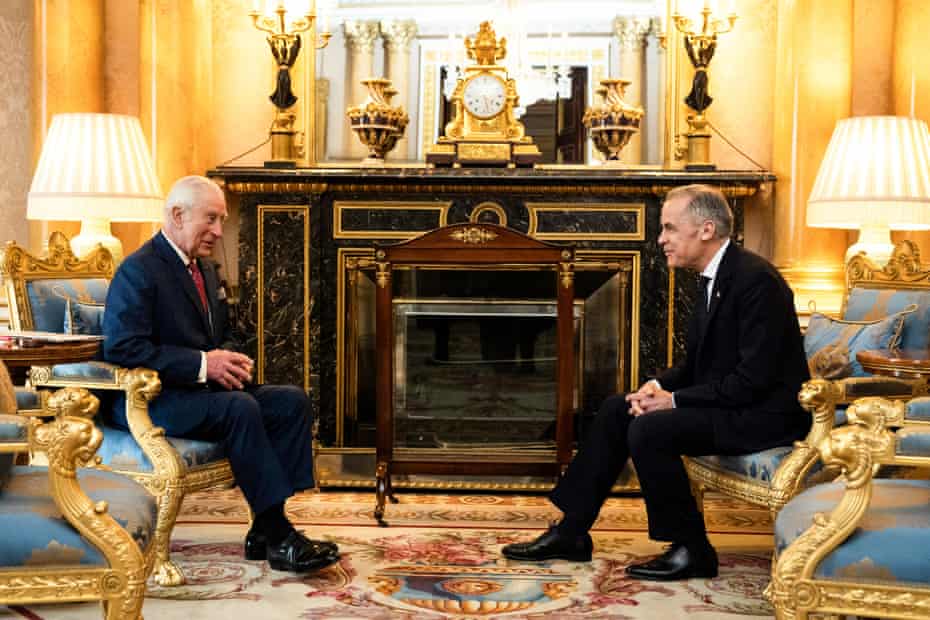King Charles III will open Canada’s new session of Parliament on 27 May, the first time in over six decades that a reigning monarch will deliver the Speech from the Throne in Ottawa. Prime Minister Mark Carney called the visit “an historic honour that matches the weight of our times.”
The symbolic move comes amid growing geopolitical tensions, as Carney prepares to meet U.S. President Donald Trump in Washington on Tuesday. Trump, who dominated the Canadian election cycle with threats of annexation and trade aggression, has imposed tariffs on Canadian goods and repeatedly questioned Canada’s sovereignty, remarks Carney has denounced as a “betrayal.”
“As I’ve stressed repeatedly, our old relationship, based on steadily increasing integration, is over,” Carney said at his first post-election news conference Friday. “The questions now are how our nations will cooperate in the future.”
Carney’s Liberal Party is poised to form a minority government after Monday’s election, with a projected 168 seats. The Conservatives follow with 144, while the Bloc Québécois captured 23, the New Democrats seven, and the Greens one. With recounts pending in two ridings, the balance of power may yet shift slightly.
Despite the minority status, Carney rejected the notion of a formal governing pact with the New Democrats, unlike his predecessor Justin Trudeau’s 2021 arrangement.
“Canadians elected a new government to stand up to President Trump and build a strong economy,” Carney said, noting his party won the most votes in Canadian history.
He announced a gender-balanced cabinet will be sworn in on 12 May, with Parliament resuming on 27 May under the King’s ceremonial leadership, a moment Carney says “clearly underscores the sovereignty of our country.”
Facing criticism that his party has not adequately addressed voter concerns, Carney pledged a tougher stance on crime, including changes to bail laws for individuals accused of serious offenses such as human trafficking, auto theft, and home invasion.
On housing, he promised tax cuts for new builds and major efforts to boost housing supply, citing affordability as a pressing issue across Canada.
“I’m in politics to do big things, not to be something,” Carney declared. “Now that Canadians have honoured me with a mandate to bring about big changes quickly, I will work relentlessly to fulfil that trust.”
Conservative leader Pierre Poilievre, who failed to win his own seat, will have the opportunity to run in a by election. Carney pledged to fast-track the process as soon as the Conservatives choose a member to vacate their seat.
“No games,” he said bluntly.
Much of the media focus, however, centered on Carney’s upcoming White House meeting. Amid rising economic tensions, the prime minister warned against expectations of a breakthrough.
“Do not expect white smoke out of that meeting,” he said, referencing papal conclave tradition.
Carney confirmed he would press for the removal of what he called unjustified tariffs, particularly those tied to the alleged flow of fentanyl into the U.S. from Canada, which experts say lacks evidence.
“The fentanyl-related tariffs, we don’t understand why they’re still in place,” he said in French.
When asked directly about Trump’s offhand suggestion that Canada could become the 51st U.S. state, Carney was unequivocal:
“It’s always important to distinguish want from reality.”
The last time a monarch opened Canada’s Parliament was in 1957, when Queen Elizabeth II visited Ottawa. King Charles’s upcoming appearance is being interpreted as a statement of continuity, unity, and symbolic resistance to outside pressure.
In a time of global uncertainty, rising nationalism, and testy cross-border relations, Canada’s government is attempting to strike a balance between asserting sovereignty and managing its closest,nand now most unpredictable, ally.

